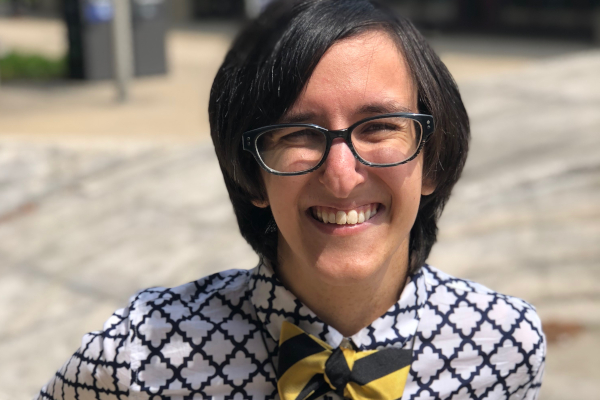Accessibility staffer aims to change culture at American Anthropological Association
Accessibility staffer aims to change culture at American Anthropological Association
- June 19, 2020 |
-
 Kathryn Walson
Kathryn Walson

Nell Koneczny uses outreach, education and universal design to bring accessibility to the forefront
 Koneczny
Koneczny
This is how Koneczny describes her photograph on the AAA website for people who cannot see the photo.Image description: Nell, a white woman with short black hair, wears thick, black-rimmed glasses and smiles at the camera. She also wears a collared, button-up shirt that is white with a dark quatrefoil pattern; a black and gold diagonal stripe bow tie; and a glass pendant necklace. She is outside on a sunny day and leans back on the concrete structure behind her.
Nell Koneczny's role is new for the American Anthropological Association, and perhaps for the association world. At least she's not aware of another professional association having a full-time accessibility and meetings coordinator.
A disability research interest group within AAA advocated for creating the position. Koneczny, who has a master's degree in disability and human development and a background in academia, was hired in June 2019.
Koneczny said her role is about more than complying with the legal requirements for accommodating people with disabilities.
"My position actually goes a step beyond that, to include disability culture and to actually think about accessibility more broadly … instead of waiting for a disabled person to reach out to us and request an accommodation," she said.
Koneczny aims to use education and outreach to bring accessibility to the forefront at AAA. She employs universal design to reach the broadest number of people possible, regardless of disability.
Associations looking to be more inclusive can identify disability groups within the organization or determine how people with disabilities connect with each other, Koneczny said. If nothing like that exists, associations can work with members to create a group.
If a leader isn't aware of members with disabilities, they should ask: "Why is that the case? Is the association … ignoring access needs or accommodation requests? … Are people not getting involved in the association because they don't feel heard even when they are present? Do people who may typically not feel comfortable disclosing their disability feel like they have a reason to be uncomfortable with it?"
Koneczny uses a wheelchair or cane, depending on the circumstances. She needs a chair to sit in most of the time and must make sure that she will not be required to walk long distances.
Koneczny has worked to make accessibility an obvious part of AAA. There is now a section on the association's website dedicated to accessibility and accommodation, and she has led webinars about accessibility. She's trained people on giving an "accessible introduction" at the beginning of presentations or meetings for anyone who is blind or low vision or, in a physical space, someone whose view might be blocked because they are in a wheelchair behind other people.
A typical introduction for Koneczny might be: "Hi, I'm Nell. I use she/her/hers. I'm the accessibility and meetings coordinator for the American Anthropological Association. I'm a short white woman with short black hair wearing glasses, a shirt with roses on it, and sitting in a chair right now."
Koneczny also coaches presenters on providing lists of technical terms so live-caption writers and sign-language interpreters have time to prepare. She reminds members, both with and without disabilities, that "there are different types of access needs, and a lot of access needs actually rely on collective efforts."
"I, as the coordinator, by myself cannot, for example, make sure that a space has no chemical scents like perfumes or colognes or cleaning products unless members are willing to not wear colognes or perfumes to mitigate the risk of triggering a migraine for another member."
Koneczny works with teams across the organization, asking that they include alt text and image descriptions and make sure a document is screen-reader friendly. She launched #AccessibleAnthro on Twitter, where she posts information related to accessibility. And she writes a column in the member-led magazine.
Full-time job
At many groups, accessibility falls under diversity and inclusion initiatives.
"Diversity and inclusion is so broad that I worry about how we throw everything … under that umbrella and expect the person in charge of that initiative to be fully in charge of all of these different aspects," she said. "There needs to be a person on staff who is dedicated solely to … accessibility in general.
"They will be able to build accessibility into every aspect of the association and not have it as an afterthought, which then requires retrofitting. And retrofitting is honestly so painful and costly. I've been on projects where I come in halfway through and I kindly tear it apart."
She cited the current remote-work environment. Virtual meetings are more difficult to follow for people accustomed to reading lips, so captioning is needed, which can benefit people beyond the intended group. She made sure the Association of Senior Anthropologists had captions added to presentations.
"They were beyond thrilled because suddenly they weren't struggling to hear the presenters. They could just read if they missed anything," Koneczny said.
She recommends that associations put aside money in an "access fund" to meet staff's needs. Because people's needs change with medical conditions and age, Koneczny recommends doing annual check-ins with staff.
Association leaders should "be very honest (that) your accommodation request will not lead to a loss of job."
"I hope associations will more actively recruit people with disabilities," she said. "The perspectives we provide are much more powerful than just about disability. We have, like most people in underrepresented groups … perspectives and interactions with the world which can absolutely strengthen our associations. It can support a lot more innovation that wouldn't happen otherwise."
